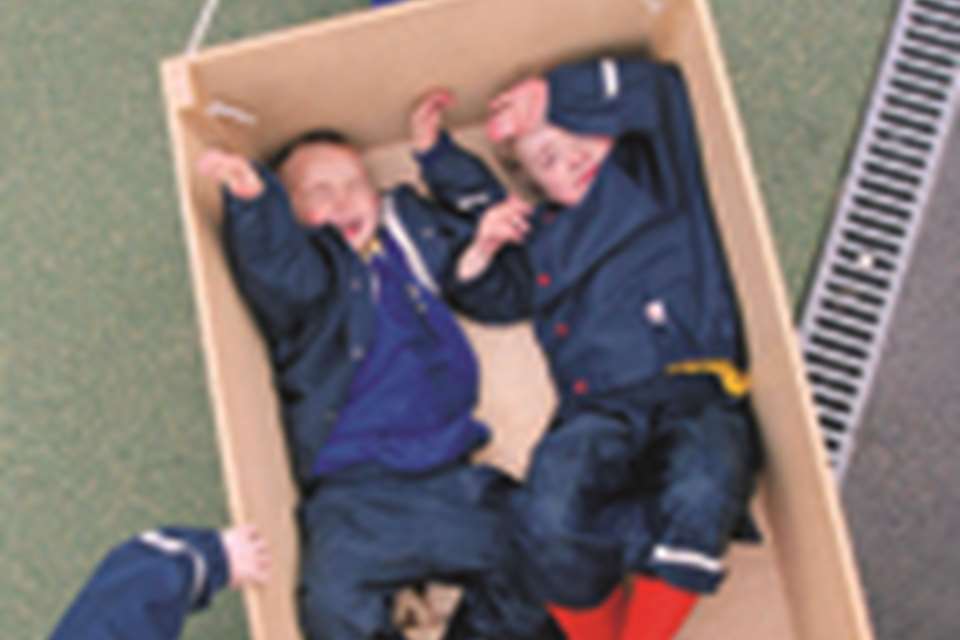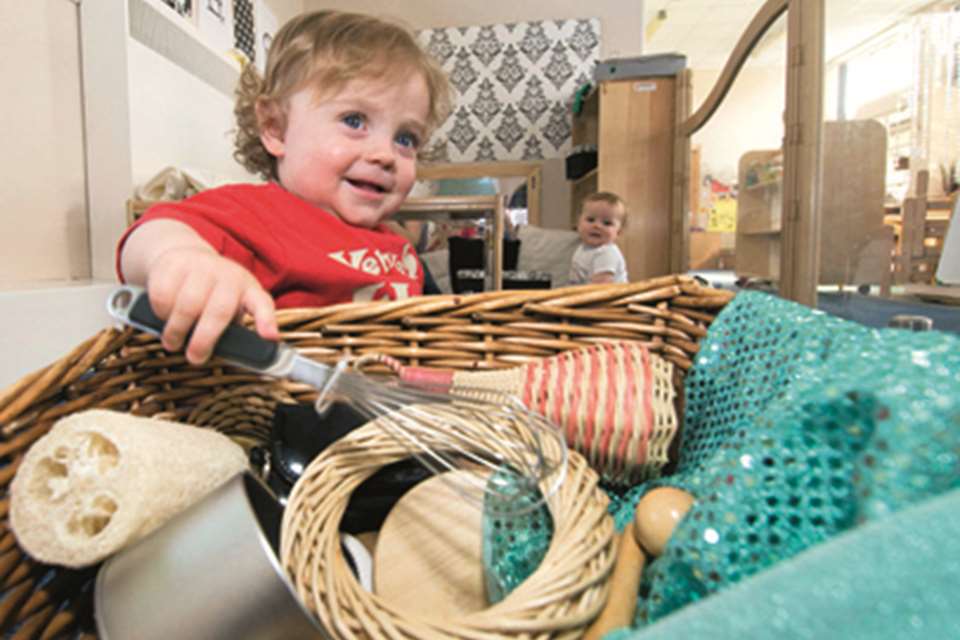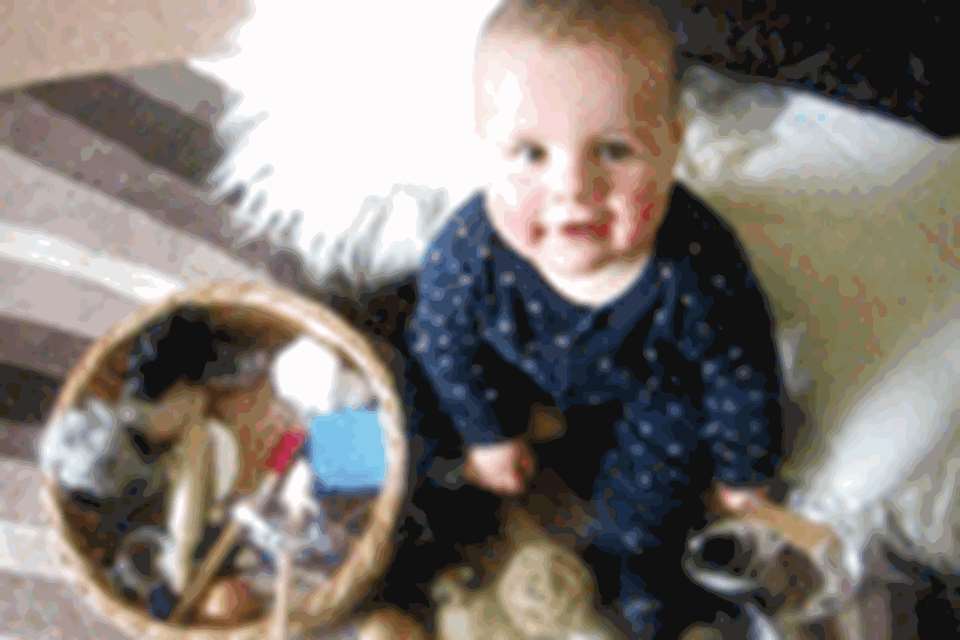Learning & Development: Elinor Goldschmied - A life revisited
Ruth Thomson
Monday, May 5, 2014
The legacy of early years pioneer Elinor Goldschmied has been given new life in a film looking at her lasting influence on practice. By Dr Jacqui Cousins, Anita M Hughes and Dorothy Y Selleck
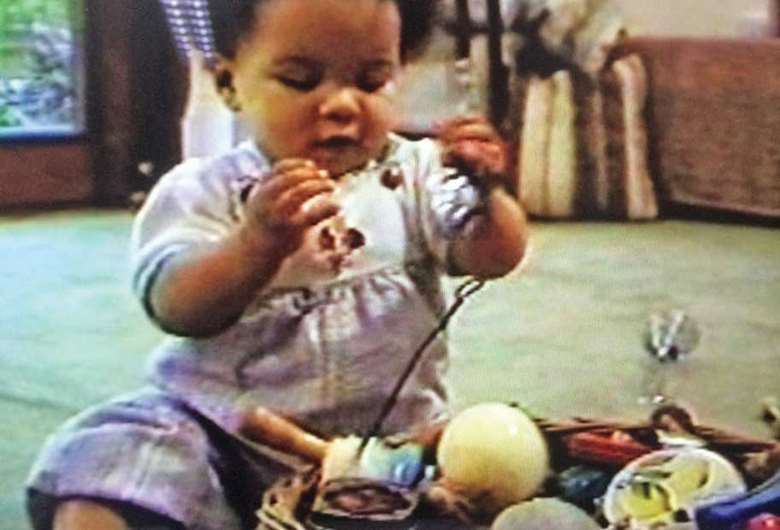
Creator of the Treasure Basket, heuristic play and the key person approach, Elinor Goldschmied was one of the most significant pioneers in the world of early childcare in the 20th century. Now a new film from the The Froebel Trust, revisits her work, explores its continuing relevance and shows how one London nursery school is developing her ideas.
Called Discovered Treasure, the documentary and training film is the culmination of the Elinor Goldschmied Froebel Archive Project, dedicated to recording and celebrating her work.
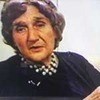 Before she died in 2009, Elinor bequeathed her films to the Froebel Archive collection. Professor Tina Bruce then secured funding from The Froebel Trust to set up the project and collate Elinor's published work, handwritten notes and films.
Before she died in 2009, Elinor bequeathed her films to the Froebel Archive collection. Professor Tina Bruce then secured funding from The Froebel Trust to set up the project and collate Elinor's published work, handwritten notes and films.
Elinor made or directed more than 20 films between 1950 and 1992 in Italy, the USA and the UK. The DVD draws heavily on this material, along with excerpts from interviews for the 'Distinguished Women' archive of the British Library. Also included is Eastwood Nursery School's work on heuristic play.
LIFE AND PRACTICE
In all, the DVD provides insights into Elinor's life, practice and influences. Born into a prosperous professional English family in rural Gloucestershire in 1910, Elinor said, in a British Library interview, 'We should never deny the impact of our childhood experiences either on our own life-long development or on our professional thinking about young children.'
Her imaginative and innovative practice, she explained, sprang from her own 'insatiable curiosity and love of stories and imaginative play'. To lie in the grass to examine the 'minute particulars' of insects and flowers gave her the greatest pleasure.
When she was 18, she decided to become a teacher and studied for three years at the Froebel Institute, alongside Susan Isaacs, after which she took a teaching post at the progressive Dartington Hall school in Devon.
In 1937 she won a scholarship to the mental health course at the London School of Economics, where she qualified as a psychiatric social worker.
After the war, she moved to Italy with her husband, but returned to the UK in 1955 and worked at The Tavistock Institute with Professor John Bowlby, who was developing attachment theory. She later worked as an independent consultant in Italy, Spain, the USA and UK.
KEY PERSON APPROACH
The key person approach has its origins in Elinor's early experiences and seminal work on 'personalised care' in Italian orphanages in the 1950s. As a child, Elinor suffered great sadness after the deaths of both her favourite brother and mother. She was also to lose both her father and husband at a young age.
During the Second World War, she moved to Bradford to take charge of a home for what she described as 'very disturbed children who were un-billetable because they were so wild ... many were Jewish refugees who had been transported without their families ... some were orphans. Can you imagine what that must have been like for them?'
Elinor created order by giving each child a special person to care for them in a family group. In a few weeks, she observed how quickly the situation had transformed and how much the children settled.
 Her experiences in Italy cemented her early thoughts on the key person approach. In a British Library interview, she recalled, 'I worked in Trieste in '54 and '55. These children were rocking, glass eyed; they were frozen children with no personal relationships, and no play activity ... illegitimate children in institutions cared for by nuns.
Her experiences in Italy cemented her early thoughts on the key person approach. In a British Library interview, she recalled, 'I worked in Trieste in '54 and '55. These children were rocking, glass eyed; they were frozen children with no personal relationships, and no play activity ... illegitimate children in institutions cared for by nuns.
'The nuns worked all hours and their own personal and emotional needs were not taken into account. The rule of the order was that if you made a relationship you were out, you were moved ... the children suffered ... the crucifixion of those women! What did I do? I transformed it. We divided it into small groups, personalised the care and offered good play activity.'
As a result of this, Elinor always addressed the needs of adults, carers and parents, as well as children. Her advice was always practical and she stressed the need for designated times in the day for the key person and their children to play and talk together.
TREASURE BASKETS
Elinor always said that her most innovative and important contributions to early years work were her ideas about play in early infancy, in particular the Treasure Basket.
Although she introduced the Treasure Basket to practitioners in the early 1950s, and it quickly became embedded in the Italian nursery system, it was not until the 1980s that people began to understand the concept in the UK.
Initially, Elinor faced criticisms about the 100 or so natural and everyday items in a basket being dull in appearance or unsuitable for babies. Practitioners believed that bought toys were superior to natural objects such as pine cones and shells. However, with the explosion of neurological research since the 1990s, a renewed appreciation of the value of sensory learning and the recognition of the sensory richness of natural materials has brought the Treasure Basket and heuristic play into almost all nurseries in the UK.
The film includes footage of Elinor showing her Treasure Basket and explaining it in her own words. She answers difficult questions and highlights the importance of choice for babies to explore items at their own pace and in their own way.
HEURISTIC PLAY
Elinor introduced the ideas about heuristic play in the early 1980s as being 'scientific and mathematical' learning through the experimental activity of pre-verbal toddlers interacting with open-ended sensory material and containers. She prescribed in detail how these sessions should be set up and this can also be seen on the film.
While Elinor saw heuristic play as a 'way of life', she did not envisage that the structure of the sessions could work with older children with language skills. But her work has now been developed by staff at Eastwood Nursery School, where three- and four-year-olds are offered heuristic play sessions.
 The film shows how the principles of heuristic play can be applied not only in a contemporary early years setting, but also with slightly older children. Once again there is a rich variety of material available and the adult is calm and attentive, enabling the children to explore freely and concentrate.
The film shows how the principles of heuristic play can be applied not only in a contemporary early years setting, but also with slightly older children. Once again there is a rich variety of material available and the adult is calm and attentive, enabling the children to explore freely and concentrate.
With this age group, there is more movement, verbal commentary and planning in the play and they sometimes use the materials in a more symbolic way. But for the most part, their play is exploratory and resembles that of children under two. There is also a great sense of purpose, concentration and calmness, even at the end of a 40-minute session.
Watching these children engaged in such a quiet, purposeful, concentrated activity of their choosing is an inspiration. It is a reminder too of Elinor's continuing relevance - and the potential influence she may yet exert on future practice.
REFERENCES AND FURTHER READING
- Cousins, J (1999), Listening to Four-Year-Olds: how they can help plan their care and education
- Elfer, P, Goldschmied, E and Selleck, DY (2012), Key Persons in the Early Years, Routledge
- Forbes, R (2004), Beginning to Play, Maidenhead: Open University Press
- Goldschmied, E and Jackson, S (2004), People Under Three: young children in day care (2nd ed)
- Grenier J, 'An historical survey of the development and contestation of the key person approach', http://juliangrenier.blogspot.co.uk/2011/03
- Hughes, AM (2010), Developing Play for the Under 3s: the treasure basket and heuristic play (2nd ed), David Fulton
- Hughes, AM and Read, V (2012) Building positive relationships with parents of young children, David Fulton
- Read, V (2014), Developing Attachments in Early Years Settings (2nd ed) London, David Fulton.
Nursery World
Previous Nursery World articles on Goldschmied and her work include:
- Biography and tribute titled 'Elinor Goldschmied' by Sonia Jackson, part of our early years pioneers series, and 'First choice' by Anita Hughes
- Key person approach articles - 'Friendship between babies', by Elinor Goldschmied and Dorothy Y Selleck (June 1996, print version only); 'Look who's talking' by Peter Elfer and Dorothy Y Selleck (15 Feb 1996, print version only), and 'Firmly attached' by Peter Elfer. For Anne O'Connor's 'Key people' and 'Attachment' series, visit, www.nurseryworld.co.uk/positive-relationships
- Treasure baskets and heuristic play - 'Hidden treasure' and 'A whole new world', a two-part series on heuristic play by Jacqui Cousins (11 and 18 July 1996, print version only), and 'All about ... heuristic play' by Jools Page.
All articles, unless indicated, can be found at www.nurseryworld.co.uk.
INTERNATIONAL FROEBEL SOCIETY CONFERENCE
Canterbury Christ Church University is hosting an international conference from 26-28 June 2014 on play and development in partnership with the International Froebel Society. The final day (Saturday) will be a practitioners' conference. The organisers are expecting about 250 delegates from around the world to present their research and share new thinking on the importance of play for all children's development and learning. Key speakers include Tina Bruce, David Whitebread and Lydia Plowman. See www.intfroebelsoc.org/conferences.html
DISCOVERED TREASURE
- Discovered Treasure: the life and work of Elinor Goldschmied 1910-2009, a DVD and booklet, priced £18, is available from The Froebel Trust. Email office@froebeltrust.org.uk
- You can visit the Elinor Goldschmied Collection in the Froebel Archive for Childhoood Studies. See www.roehampton.ac.uk/Library/Resources/Archives-and-special-collections.



